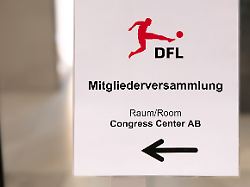With a very, very narrow majority
Bundesliga clubs clear the way for billion-dollar investors
December 11, 2023, 2:22 p.m
Up to six interested parties are reportedly already ready, the goal is a billion-dollar deal. The 36 clubs in the 1st and 2nd Bundesliga voted by a very narrow majority to open up to negotiations. At the same time, the DFL also names which points are non-negotiable.
In the second attempt, German professional football cleared the way for an investor to get involved. At the meeting of the 36 first and second division clubs in Frankfurt/Main, the necessary two-thirds majority for negotiations between the German Football League (DFL) and potential donors was barely achieved. Participants confirmed this after the meeting. In May the efforts had failed.
The majority could not have been narrower: 24 yes votes, ten no votes, two abstentions. The new plan calls for selling six to nine percent of the shares in a DFL subsidiary, to which all media rights will be outsourced, for 20 years. There should be between 800 million and one billion euros for this.
Ideally, 600 million will go to the DFL central administration to further develop the business model (digitization, streaming platform, etc.). According to the valid distribution key, the clubs will receive 300 million to compensate for the initially resulting shortfall in media income. The remaining 100 million will be used to create a compensation system that rewards clubs that travel abroad for advertising purposes.
There should be four to six interested investors from the so-called “private equity sector”. These are equity investment companies that specialize in forms of investment.
DFL draws “red lines”
The first attempt to get an investor on board failed around six months ago. At that time, the necessary two-thirds majority was missed. The plan called for selling 12.5 percent of the shares in a subsidiary over 20 years. Two billion euros should be raised. The model was risky because even with moderate revenue growth (currently just under 1.3 billion per season), 12.5 percent over two decades would have been significantly more than three billion – all in all, a huge loss-making business.
Before the vote, the two DFL managing directors Marc Lenz and Steffen Merkel informed the clubs about the plans in several rounds of discussions. “Red lines” were drawn. Sovereign rights should not be surrendered. There should be no “co-determination rights of a partner with regard to competitive games abroad, kick-off times or in the area of game planning”. And: “After the temporary minority shareholding expires, the licensed rights would automatically revert to the DFL eV.”
Nevertheless, there was criticism. Above all, the question arose as to why the clubs cannot provide the necessary investment sum of 600 million euros on their own. However, the DFL bosses did not see a majority in favor of so-called “domestic financing”. Some club bosses had once again threatened to split professional football if the two-thirds majority was missed again. On the other hand, the fan groups were clearly against the deal.
